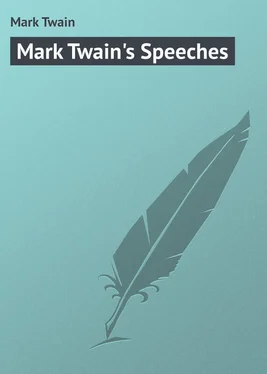Mark Twain - Mark Twain's Speeches
Здесь есть возможность читать онлайн «Mark Twain - Mark Twain's Speeches» — ознакомительный отрывок электронной книги совершенно бесплатно, а после прочтения отрывка купить полную версию. В некоторых случаях можно слушать аудио, скачать через торрент в формате fb2 и присутствует краткое содержание. Издательство: Array Иностранный паблик, Жанр: foreign_prose, на английском языке. Описание произведения, (предисловие) а так же отзывы посетителей доступны на портале библиотеки ЛибКат.
- Название:Mark Twain's Speeches
- Автор:
- Издательство:Array Иностранный паблик
- Жанр:
- Год:неизвестен
- ISBN:нет данных
- Рейтинг книги:3 / 5. Голосов: 1
-
Избранное:Добавить в избранное
- Отзывы:
-
Ваша оценка:
- 60
- 1
- 2
- 3
- 4
- 5
Mark Twain's Speeches: краткое содержание, описание и аннотация
Предлагаем к чтению аннотацию, описание, краткое содержание или предисловие (зависит от того, что написал сам автор книги «Mark Twain's Speeches»). Если вы не нашли необходимую информацию о книге — напишите в комментариях, мы постараемся отыскать её.
Mark Twain's Speeches — читать онлайн ознакомительный отрывок
Ниже представлен текст книги, разбитый по страницам. Система сохранения места последней прочитанной страницы, позволяет с удобством читать онлайн бесплатно книгу «Mark Twain's Speeches», без необходимости каждый раз заново искать на чём Вы остановились. Поставьте закладку, и сможете в любой момент перейти на страницу, на которой закончили чтение.
Интервал:
Закладка:
Mark Twain's Speeches
With An Introduction
by William Dean Howells
Introduction
These speeches will address themselves to the minds and hearts of those who read them, but not with the effect they had with those who heard them; Clemens himself would have said, not with half the effect. I have noted elsewhere how he always held that the actor doubled the value of the author’s words; and he was a great actor as well as a great author. He was a most consummate actor, with this difference from other actors, that he was the first to know the thoughts and invent the fancies to which his voice and action gave the color of life. Representation is the art of other actors; his art was creative as well as representative; it was nothing at second hand.
I never heard Clemens speak when I thought he quite failed; some burst or spurt redeemed him when he seemed flagging short of the goal, and, whoever else was in the running, he came in ahead. His near-failures were the error of a rare trust to the spontaneity in which other speakers confide, or are believed to confide, when they are on their feet. He knew that from the beginning of oratory the orator’s spontaneity was for the silence and solitude of the closet where he mused his words to an imagined audience; that this was the use of orators from Demosthenes and Cicero up and down. He studied every word and syllable, and memorized them by a system of mnemonics peculiar to himself, consisting of an arbitrary arrangement of things on a table – knives, forks, salt-cellars; inkstands, pens, boxes, or whatever was at hand – which stood for points and clauses and climaxes, and were at once indelible diction and constant suggestion. He studied every tone and every gesture, and he forecast the result with the real audience from its result with that imagined audience. Therefore, it was beautiful to see him and to hear him; he rejoiced in the pleasure he gave and the blows of surprise which he dealt; and because he had his end in mind, he knew when to stop.
I have been talking of his method and manner; the matter the reader has here before him; and it is good matter, glad, honest, kind, just.
W. D. Howells.Preface
From the preface to the English edition of “ Mark Twain’s sketches ”
If I were to sell the reader a barrel of molasses, and he, instead of sweetening his substantial dinner with the same at judicious intervals, should eat the entire barrel at one sitting, and then abuse me for making him sick, I would say that he deserved to be made sick for not knowing any better how to utilize the blessings this world affords. And if I sell to the reader this volume of nonsense, and he, instead of seasoning his graver reading with a chapter of it now and then, when his mind demands such relaxation, unwisely overdoses himself with several chapters of it at a single sitting, he will deserve to be nauseated, and he will have nobody to blame but himself if he is. There is no more sin in publishing an entire volume of nonsense than there is in keeping a candy-store with no hardware in it. It lies wholly with the customer whether he will injure himself by means of either, or will derive from them the benefits which they will afford him if he uses their possibilities judiciously.
Respectfully submitted,
The author.The Story Of A Speech
An address delivered in 1877, and a review of it twenty-nine years later. The original speech was delivered at a dinner given by the publishers of The Atlantic Monthly in honor of the seventieth anniversary o f the birth of John Greenleaf Whittier, at the Hotel Brunswick, Boston, December 17, 1877.
This is an occasion peculiarly meet for the digging up of pleasant reminiscences concerning literary folk; therefore I will drop lightly into history myself. Standing here on the shore of the Atlantic and contemplating certain of its largest literary billows, I am reminded of a thing which happened to me thirteen years ago, when I had just succeeded in stirring up a little Nevadian literary puddle myself, whose spume-flakes were beginning to blow thinly California ward. I started an inspection tramp through the southern mines of California. I was callow and conceited, and I resolved to try the virtue of my ‘ nom de guerre ’.
I very soon had an opportunity. I knocked at a miner’s lonely log cabin in the foot-hills of the Sierras just at nightfall. It was snowing at the time. A jaded, melancholy man of fifty, barefooted, opened the door to me. When he heard my ‘ nom de guerre ’ he looked more dejected than before. He let me in – pretty reluctantly, I thought – and after the customary bacon and beans, black coffee and hot whiskey, I took a pipe. This sorrowful man had not said three words up to this time. Now he spoke up and said, in the voice of one who is secretly suffering, “You’re the fourth – I’m going to move.” “The fourth what?” said I. “The fourth littery man that has been here in twenty-four hours – I’m going to move.” “You don’t tell me!” said I; “who were the others?” “Mr. Longfellow, Mr. Emerson, and Mr. Oliver Wendell Holmes – consound the lot!”
You can, easily believe I was interested. I supplicated – three hot whiskeys did the rest – and finally the melancholy miner began. Said he:
“They came here just at dark yesterday evening, and I let them in of course. Said they were going to the Yosemite. They were a rough lot, but that’s nothing; everybody looks rough that travels afoot. Mr. Emerson was a seedy little bit of a chap, red-headed. Mr. Holmes was as fat as a balloon; he weighed as much as three hundred, and had double chins all the way down to his stomach. Mr. Longfellow was built like a prizefighter. His head was cropped and bristly, like as if he had a wig made of hair-brushes. His nose lay straight down, his face, like a finger with the end joint tilted up. They had been drinking, I could see that. And what queer talk they used! Mr. Holmes inspected this cabin, then he took me by the buttonhole, and says he:
“‘Through the deep caves of thought
I hear a voice that sings,
Build thee more stately mansions,
O my soul!’
“Says I, ‘I can’t afford it, Mr. Holmes, and moreover I don’t want to.’ Blamed if I liked it pretty well, either, coming from a stranger, that way. However, I started to get out my bacon and beans, when Mr. Emerson came and looked on awhile, and then he takes me aside by the buttonhole and says:
“‘Give me agates for my meat;
Give me cantharids to eat;
From air and ocean bring me foods,
From all zones and altitudes.’
“Says I, ‘Mr. Emerson, if you’ll excuse me, this ain’t no hotel.’ You see it sort of riled me – I warn’t used to the ways of littery swells. But I went on a-sweating over my work, and next comes Mr. Longfellow and buttonholes me, and interrupts me. Says he:
“‘Honor be to Mudjekeewis!
You shall hear how Pau-Puk-Keewis—’
“But I broke in, and says I, ’Beg your pardon, Mr. Longfellow, if you’ll be so kind as to hold your yawp for about five minutes and let me get this grub ready, you’ll do me proud.’ Well, sir, after they’d filled up I set out the jug. Mr. Holmes looks at it, and then he fires up all of a sudden and yells:
“Flash out a stream of blood-red wine!
For I would drink to other days.’
“By George, I was getting kind of worked up. I don’t deny it, I was getting kind of worked up. I turns to Mr. Holmes, and says I, ’Looky here, my fat friend, I’m a-running this shanty, and if the court knows herself, you’ll take whiskey straight or you’ll go dry.’ Them’s the very words I said to him. Now I don’t want to sass such famous littery people, but you see they kind of forced me. There ain’t nothing onreasonable ‘bout me; I don’t mind a passel of guests a-treadin’ on my tail three or four times, but when it comes to standing on it it’s different, ‘and if the court knows herself,’ I says, ’you’ll take whiskey straight or you’ll go dry.’ Well, between drinks they’d swell around the cabin and strike attitudes and spout; and pretty soon they got out a greasy old deck and went to playing euchre at ten cents a corner – on trust. I began to notice some pretty suspicious things. Mr. Emerson dealt, looked at his hand, shook his head, says:
Читать дальшеИнтервал:
Закладка:
Похожие книги на «Mark Twain's Speeches»
Представляем Вашему вниманию похожие книги на «Mark Twain's Speeches» списком для выбора. Мы отобрали схожую по названию и смыслу литературу в надежде предоставить читателям больше вариантов отыскать новые, интересные, ещё непрочитанные произведения.
Обсуждение, отзывы о книге «Mark Twain's Speeches» и просто собственные мнения читателей. Оставьте ваши комментарии, напишите, что Вы думаете о произведении, его смысле или главных героях. Укажите что конкретно понравилось, а что нет, и почему Вы так считаете.












